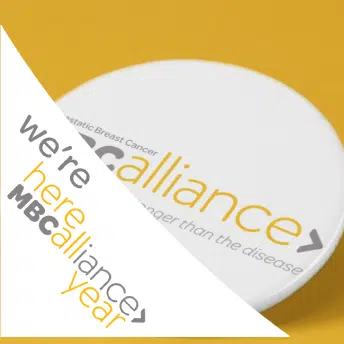PUBLISHED: 22nd February 2018

by Diane Rose
There are large gaps in research, support, information, advocacy and resources for people with advanced breast cancer. People with metastatic breast cancer who also have an inherited mutation like BRCA or PALB2 face additional challenges associated with children and other relatives sharing the same hereditary cancer risk.
The Metastatic Breast Cancer Alliance (MBCA) is a consortium of stakeholders who work together to address gaps in research and care for patients living with metastatic breast cancer. The mission of the MBCA is to “improve the lives of, and outcomes for, those living with metastatic breast cancer and their families through increasing awareness and education about the disease and advancing policy and strategic coordination of research funding – specifically focused on metastasis – that has the potential to extend life, enhance quality of life and ultimately to cure.” All Alliance members have an equal “seat at the table,” and each participating organization contributes at least one staff member to the group’s work.
As an organization that serves anyone who is affected by hereditary breast, ovarian, pancreatic, prostate and related cancers, FORCE also strives to improve outcomes for people who are affected by metastatic hereditary breast cancer. FORCE has been a member of the MBCA since its inception.
As Vice President of Volunteer Programs, I attended the MBCA fall retreat, along with 40 other Alliance members representing the nonprofit sector, biotech industry, researchers and independent advocates. Compared to when the Alliance was formed in 2014, the current MBC landscape reflects significant improvements in funding for related research in recent years, but there is a large need for more progress. As a group at the retreat, we identified gaps where the Alliance needs to focus efforts in 2018, including:
- Addressing symptoms and treatment side effects
- Increasing health care provider awareness of and assistance with addressing quality-of-life issues
- Improving emotional support
- Reducing/eliminating financial toxicity
- Removing health equity and disparities, especially for black women
- Identifying information needs on diagnosis, treatment options and financial resources
- Removing barriers for MBC patients seeking genetic counseling and testing
Lisa Schlager, FORCE’s VP of Public Policy, serves on the MBCA Public Awareness Task Force. During the MBCA meeting at the 2017 San Antonio Breast Cancer Symposium, Lisa presented FORCE’s programs that address hereditary metastatic breast cancer.
FORCE Programs Serve Those with Hereditary Metastatic Breast Cancer
FORCE programs are built on four pillars: Education and Awareness, Support, Research and Advocacy.
Education and Awareness. Knowing whether one’s cancer is caused by an inherited genetic mutation is vitally important. The test outcome can affect surgical and treatment decisions, eligibility for certain clinical trials and ultimately impact family members who may also be at increased risk of cancer. Now that a targeted therapy has been approved for hereditary metastatic breast cancer and clinical trials are enrolling hereditary cancer patients, it is even more important for metastatic breast cancer patients to know if they carry an inherited mutation. We have a page with treatment information specifically for people affected by metastatic hereditary breast cancer. Our new “KNOW MORE: Breast Cancer” initiative will address this need by raising awareness about the importance of genetic counseling and testing for this patient population. As part of this initiative, FORCE is conducting a survey for breast cancer survivors and will use the information gathered to develop resources to address the knowledge gaps identified.
Our XRAYS program is an important piece of our educational outreach for young breast cancer survivors. Our weekly XRAYS reviews and ratings of breast cancer research and related media coverage helps survivors to better understand the research and its relevance to them. XRAYS articles are categorized by relevant target audience, including people with metastatic disease, women or men under/over 45, etc.
Support. All FORCE support programs strive to meet the needs of those with MBC, but our unique Peer Navigation Program deserves special attention. It closely matches cancer survivors with a trained peer volunteer and personalized resources based on their age, gender, cancer status and stage, geographic location and specific aspects of their hereditary cancer journey. Participants also receive a free personalized resource guide based on their areas of interest, including paying for cancer treatment, quality of life issues and participation in research.
Research. The enriched database of our Hereditary Cancer Research Study Search Tool facilitates easy identification of clinical trials for which individuals may qualify,
including studies that are specifically enrolling people with metastatic hereditary breast cancer.
Advocacy. FORCE is the only organization that advocates specifically for the hereditary cancer community. Our public policy work on behalf of those with MBC includes efforts to preserve protections of the Affordable Care Act, including coverage for participation in clinical trials and prohibiting insurance exclusions or increased costs for preexisting conditions. Our advocacy efforts also include fighting for oral parity laws, assisting with insurance appeal letter, and advocating for funding for cancer research.
POSTED IN: FORCE And FORCE Impact
TAGS: Breast Cancer , Metastatic Breast Cancer , Advanced Breast Cancer , Mbc